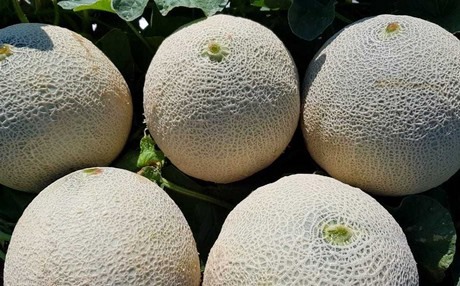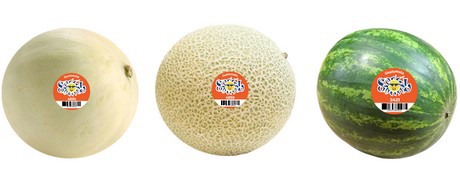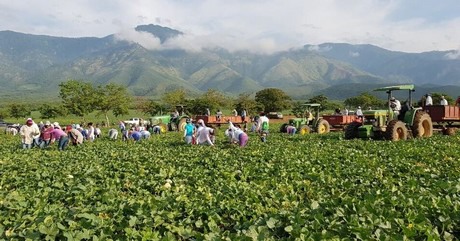After a summer of domestic production, the cantaloupe season has now largely moved offshore for the winter months. For Sol Melons, who say they are the largest grower, packer and shipper of melons during the offshore season, their cantaloupes are currently grown in Guatemala, with the Honduras season starting shortly as well. Supplies are a little short right now which is leading to a more active market.
"Sol has uniquely owned and operated its farms since 1985," said Juan Carlos Blanco of Sol Melons. "Our cantaloupes are presently grown in Guatemala and starting in January, we will start receiving cantaloupes from our farms in Honduras as well, with the offshore season going until May."
"We believe there will be less supply in the marketplace this year," he continued. "The season just started and the demand is very strong right now as the pipeline is very clean due to the fact that domestic US and Mexican fruit is disappearing earlier than the last few years. We expect this trend to continue through the season."

New varieties available this season
Sol Melons shared that the bulk of their melon volume is made up of cantaloupes, honeydews, mini watermelons and large seedless watermelons. However, the company also carries some other interesting melon varieties, including two new varieties that are being introduced this season - the SOLito and Sol Honeydude.
"Sol Melons carries specialty varieties such as yellow honeydews and Royal cantaloupes in limited volumes, to cater to a specific market demand," Blanco noted. "This season, we are introducing a few new varieties, including the SOLito and Sol Honeydude. SOLito is an evenly round mini watermelon with smooth outer green skin and dark green stripes. Seedless, it has a deep red and slightly crunchy textured flesh. Refreshingly juicy and sweet, it’s grown in Guatemala and Honduras. SOL Honeydude is a round, creamy-colored honeydew. Its firm rind is more tolerant to wind scratches and sugar cracks. Full and juicy, it has a light-colored flesh with a small seed cavity, and a sweet-smelling aroma."
Coinciding with the new melon varieties on offer, Sol Melons said it has refreshed their packaging as well as introduced new stickers on their melons. Help is also available for retailers who want to build a program with Sol. "We offer a large promotional program to assist retailers to sell additional volume and grow the melon category," Blanco explained. "We can customize this program to meet each retailer’s needs. Promotions include special offers based on geolocation, display contest, social media contests, cross-promotions, just to name a few."

Fair Trade becoming more important to consumers
With Sol Melons being such a large melon grower with a significant presence throughout Central America, the company felt the responsibility to ensure their workers and communities were looked after. Therefore, the company decided to participate in obtaining Fair Trade certification. Sol grows over 200 million melons across 17,500 acres of farmland in Guatemala and Honduras each season and Blanco said it has now become the largest grower of Fair Trade melons in Central America. The message they are hearing is that more consumers are interested in purchasing Fair Trade melons.
"With Fair Trade Certified™ farms, we’re able to offer retailers with a continuous program throughout the season," Blanco stated. "More and more consumers are interested in purchasing products that help benefit workers in the regions where they are sourced. According to a recent statistic from the Natural Marketing Institute, more than 1 in 3 consumers are more likely to buy a product with Fair Trade certification. Additionally, with 75 percent of millennials stating fair trade as an important factor in their purchase decisions, retailers have further motivation to include fair trade offerings in their stores. This trend provides retailers with a business opportunity to invite socially conscious consumers to shop in their stores while supporting efforts to empower growing communities. When you think that just 18 boxes of Fair Trade Certified™ melons provide potable water to a farm worker and their family, together we can make a difference."

Blanco added by sharing the impact the Fair Trade premium has had on the local communities. "Through the investment of the Fair Trade premium, workers in Sol farms benefit from life-changing programs that enhance the well-being of their community," he said. "With projects that range from providing families with access to clean water and affordable healthcare to programs that benefit children with school supplies and essential necessities, the impact of every purchase of Fair Trade Certified™ melons goes a long way. Since 2014, these initiatives have benefited over 4,500 families in our growing regions in Honduras and Guatemala."
For more information:
Carolina Garcia
Fyffes North America, Inc.
Tel: +1 (305) 529-1289
cgarcia@fyffes-na.com
www.solmelons.com
